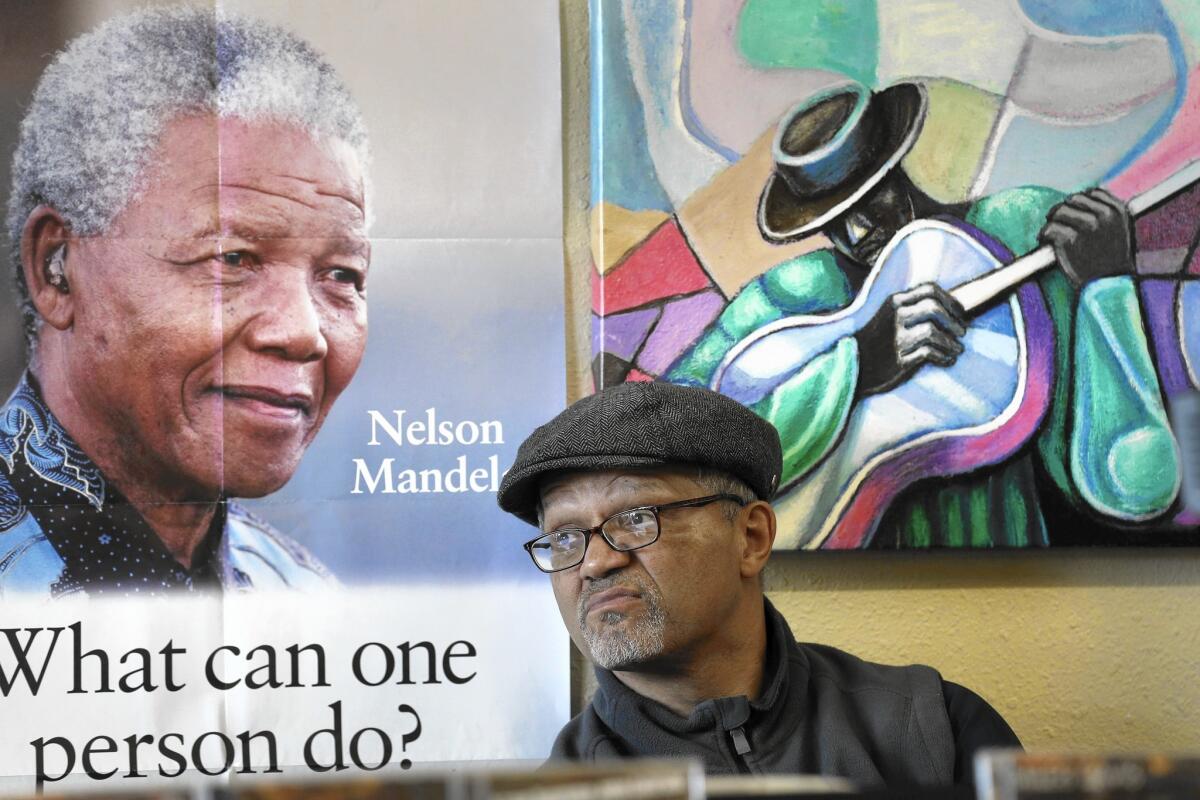Eso Won Books: Where the black experience is chronicled and cultivated

- Share via
Anthony Graham stood before the cash register at Eso Won Books in Leimert Park, weighing his thirst for knowledge against the funds in his bank account.
The $27.99 price tag for “Black Against Empire: The History and Politics of the Black Panther Party” gave him pause. Graham was also considering another book on the same subject, “The Shade of the Panther.”
“It’s bad, but not horrible,” said book store co-owner James Fugate, giving the book a firm thumbs down. “The author gets the fact straight, but doesn’t understand how the Panthers worked and how (FBI director J. Edgar) Hoover systemically tried to take them down.”
As Graham kept mulling over the higher price of the first book, Thomas Hamilton, Fugate’s business partner, interjected.
“It’s not how much it will cost you,” he said, sitting on a stool, his arms folded in front of his chest. “But how much will it cost you if you don’t get it?”
At Eso Won Books, Los Angeles’ venerable African American bookstore, customers come for hard-to-find literature that chronicles the black experience, but many keep coming back for the Siskel & Ebert-like reviews from the two shop owners.
“You can’t get that from Barnes and Nobles,” said Graham, 30, of Gardena. Fugate’s “knowledge guides me and the services are unparallel.”
Fugate and Hamilton are opposites in many ways: Fugate, 61, is tall and thin, quick-witted and opinionated. Hamilton, 62, is shorter and athletic, with a common sense, meat-and-potatoes style.
More than just book store owners, the pair are like museum curators, stewards to a collection that celebrates black culture and identity. Comic books with black superheroes, children’s books with little girls in cornrows, and fairytales with black boys — their skin unapologetically dark, their noses broad — grace the shelves.
“I can walk into a place like this and see books for me and by people like me,” said Beverly Haynes, 56, of West Adams. “This grounds me and molds me as a black woman.”
The bookstore carries classics from James Baldwin, W.E.B DuBois and Zora Neale Hurston, as well as the latest autobiographies and books on race relations.
In the era when big chains stores and small independents have folded due to competition from Amazon and e-books, Eso Won Books has survived by catering to black Los Angeles.
“We buy the books we think that people should have,” Fugate said.
The store has hosted book signings for former president Bill Clinton, poet Maya Angelou and a freshman senator from Illinois named Barack Obama.
In more recent years, Eso Won has been a cultural center for a black community jolted by the killings of Trayvon Martin, Michael Brown and Ezell Ford. They’ve come looking for answers to why things happen — from within the pages of Francis Cress-Welsing’s “The Isis Paper,” a book about symbolism, racism and white supremacy and Michelle Alexander’s “The New Jim Crow.”
Last year’s best-seller was Ta-Nehisi Coates’ “Between the World and Me.”
“Everybody in my generation thought that the battle was won,” Fugate said. “But you read these books and you see we’re fighting some of the same battles we thought we settled 50 years ago.”
Eso Won Books has weathered financial turmoil and failed business deals that promised expansion. The store has outlived dozens of black-owned niche bookstores that sprung up in the late 1980s and early 1990s to become the only such shop in Los Angeles.
Beginning with Fugate and Hamilton selling books out of the back of their car, Eso Won has changed locations several times in its 28 years. But in the last decade, it has nestled into a home in Leimert Park Village.
The book store has remained a constant, even as change has surrounded it.
Construction clogs the Crenshaw corridor as crews build the new rail line that will stop in Leimert Park. Hipsters stroll the village, long considered the epicenter of L.A.’s African American art and culture. Rents continue to rise, sparking fears that the subway station will alter the quaint quarters of the village.
On a recent Saturday, a dozen people listened as a panel discussed the lack of diversity in cinema. The sound of steel drums floated through the glass doors as customers moved in and out. As the crowd grew, Fugate went in the back to grab additional chairs. Three women, two white and one Asian, slid into the seats.
The event ended with the sounds of jazz filling the cozy space. Karen Farmer of Leimert Park and two friends visiting from Oakland and Atlanta thumbed through the books. One of the women pulled Nigerian novelist Chimamanda Ngozi Adichie’s newest, “We Should All Be Feminist,” from the top shelf.
The three women huddled together and discussed her last work, “Americanah.” Farmer said she cherishes her time at the bookstore and was excited to share it with her friends.
“It’s a tactile experience — picking up books, touching it, listening to the wonderful jazz,” she said. “This is for us.”
Back at the counter, Graham decided to buy the “The Isis Paper” and left. But Hamilton’s message stuck in his brain: Don’t let the price deprive you of the knowledge.
Two days later he returned to purchase “Black Against Empire.”
Twitter: @AngelJennings
More to Read
Sign up for Essential California
The most important California stories and recommendations in your inbox every morning.
You may occasionally receive promotional content from the Los Angeles Times.














